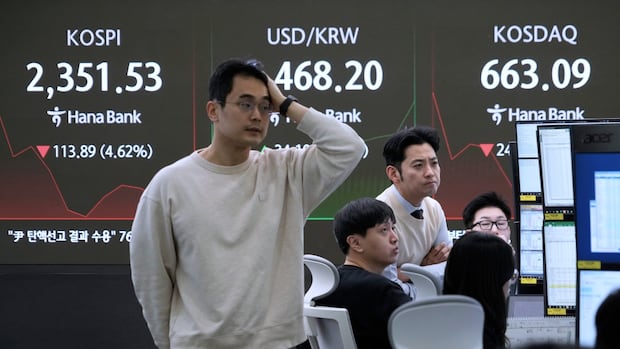World stock markets expanded a serious Monday, fed by fears that North -Americans would have a world economic slowdown. The European and Asian actions saw dramatic losses, the leader of the United States flirted with the territory of the bear market in the previous negotiation to the market and the oil prices were reduced.
Mass sale in more risky assets at the start of negotiating week follows the announcement of President Donald Trump of Import Tax and Retalia of President Donald Trump Tax and Retalia of China who saw sharply fall on Thursday and Friday.
On Sunday, Trump reiterated his resolution, saying: « Sometimes you have to take medicines to fix something. »
United States President Donald Trump again defended his rates despite the continuous chaos of the global market. In the Air Force One, Trump put a journalist and said, « Your question is so stupid. I don’t want to go down, but sometimes you have to take medicines to fix something.
North -Americans were a weakness later. For the S&P 500, they lost 3.4 percent, while for the industrial average of Dow Jones, they lowered 3.1 percent. Futures for Nasdaq lost 5.3 percent.
Some countries, South Korea and Pakistan, said that commercial officials in Washington are soon sent to seek clarity.
However, Germany Minister of Economics Robert Habeck was challenging when he arrived at a meeting of the European Union’s Ministers of Commerce in Luxembourg, saying that the premise of broad rates was « nonsense » and that attempts from individual countries to win exemptions have not worked in the past.
He said it is important that the EU joins. This means being clear that we are in a strong position: America is in a position of weakness. «
Trump has justified his rates as a matter of dealing with North -American commercial deficits, which most economists say is not a sign of economic health in itself. In the case of Canada and Mexico, he has tried to use rates to try to stop Fentanil’s flow in the United States, although Canada’s drug interdictions in the United States are relatively low.
Jpmorgan Chase’s CEO, Jamie Dimon, in his annual note read to shareholders earlier on Monday, warned investors that the crisis caused by United States’ rates, and a world trade war could slow down the growth of the world’s largest economy, promote inflation and can lead to possible negative consequences.
« The faster this problem is resolved, the better some of the negative effects, the increase in accumulated way over time and it would be difficult to reverse, » wrote the CEO.
JPMORGAN economists increased the risk of a North -American and Global Recovery this year, 60 percent of 40 percent after Trump revealed the steepest commercial barriers in more than 100 years last week.
Dimon, in January, said that Trump’s rates critics needed to « overcome it », although it allowed it at that time that they should be carefully implemented.
Flirting with bear territory
If the losses of the future of the market materialize when the US market opens, the S&P 500 will enter the territory of the bear market, defined as a fall of more than 20 percent of the peak. The index was reduced to 17.4 percent at the end of last week.
The United States Federal Reserve could deal with the rates to the North -American economy by reducing interest rates, which argued in a social media place at the beginning of Monday. This can encourage companies and homes to take and spend. But Fed President Jerome Powell said on Friday that higher rates could increase inflation expectations and that lower rates could feed even more price increases.
Front burner24:56Trump’s overall market market explained, explained
The last and serious rates of the President of the United States, Trump, have caused a blood bath in the world markets and widespread economic anxiety. JP Morgan’s main economist increased the odds of a global recession by the end of the year to 60 percent, to 40 percent. People look at their work eliminated in places like car plants and elsewhere in the manufacture sector. The journalist Joe Weisenthal is the co-presenter of the Bloomberg Odd Podcast. It is here to explain the thawing of the global market and what we can expect in the coming days. For transcripts of Front Burner, visit: https://www.cbc.ca/radio/frontburner/transcripts (https://www.cbc.ca/radio/frontburner/transcripts)
On Friday, the worst crisis in the market since the Covid-19 Pandemic became a higher team, as the S&P 500 dropped six percent and the Dow fell 5.5 percent. Nasdaq compound fell 3.8 percent.
« There is still no sign for the markets to find a background and begin to stabilize, » wrote the Deutsche Bank analysts in a research note.
Chinese markets often do not follow global trends, but they also fell. Hong Seng of Hong Kong fell 13.2 percent, while Shanghai’s composite index lost 7.3 percent. In Taiwan, Taiex fell 9.7 percent, while Kospi of South Korea lost 5.6 percent.
On Monday, Beijing reached a trust note even when Hong Kong and Shanghai markets fell. On the day of the people, the official mouthpiece of the Communist Party, he had strong words.
« The sky will not fall, » he said, even if U.S. rates have an impact. « In the face of indiscriminate tax blows of taxes, we know what we do and have tools at our disposal, » he added.
Oil prices fall
Middle Eastern stock markets decreased on Monday, as they fought with the double success of the new U.S. fare policy and a strong decrease in oil prices.
Benchmark Brent Crus has dropped almost 15 percent during the last five days of negotiation, with a barrel of oil that costs just over US $ 63. This has fallen almost 30 percent of a year ago.
This barrel cost is much lower than the estimated price for the rupture of Saudi Arabia and most other countries that produce energy in the Middle East. This joins the new rates, which saw that the states of the Bahrain, Kuwait, Oman, Qatar, Saudi Arabia, and the United Arabic Arabic affected 10 percent of rates.
« With these measures and the expected measures of retaliation that other countries could take, the stability and predictability of international trade could be undermined, » said the PWC accounting firm in advice to its clients in the medium.
Tokyo Nikkei 225 Index closed 7.8 percent. European actions followed the lowest Asian markets, led by the German Dax Index, which briefly fell more than 10 percent to Frankfurt’s weather, but recovered some land to lower 5.8 percent of morning negotiation.
















Leave a Reply